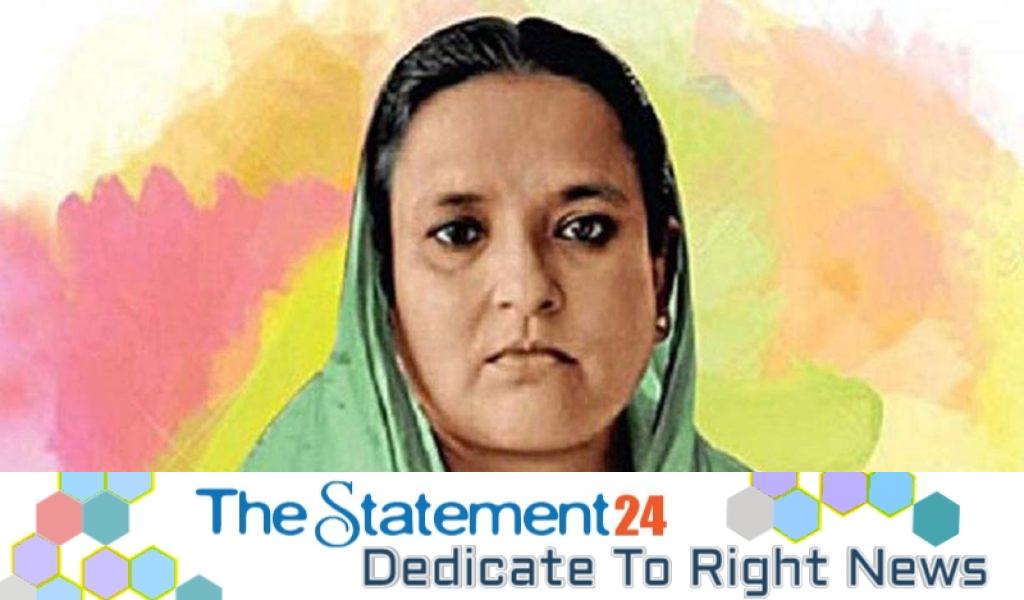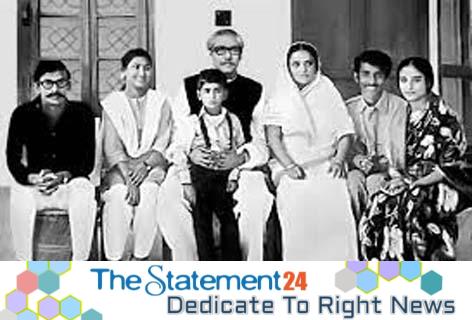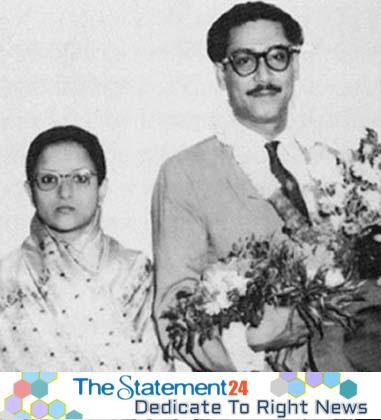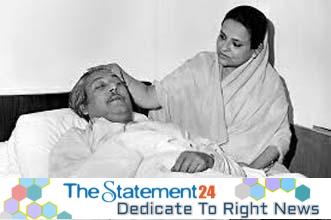
- Aleem Haider
“There is no objection that you [Sheikh Mujib] are staying in jail, but please take care of your health. I am feeling upset to see your condition.”
That was such message from Bangamata Fazilatunnesa for the Father of the Nation Bangabandhu Sheikh Mujibur Rahman who spent around 13 years of his life in jail for the liberation of the Bengali nation.
Bangabandhu was struggling to liberate his people on one side, and there was a lady with great heart and boldness to not only support him from behind but also endured all disasters alone to survive her family members. Yes, she was none but Sheikh Fazilatunnesa Mujib. She lost her father at the age of three and was married off to Sheikh Mujib, who was just 13 then. Later, Fazilatunnesa, also known as Renu, became the best friend of Sheikh Mujib in his well and woes. She extended her whole-heartedly support for Bangabandhu to achieve the rights of the people of Bengal.
Even much of their conjugal life was spent in the jail gate as Bangabandhu had to stay almost thirteen years of his life (4,682 days) in prison since school life. Before independence, Begum Fazilatunnesa Mujib used to meet her husband Bangabandhu in jail on a regular basis. They had to meet in front of the jail officials. And the process was so painful that Bangabandhu mentioned it as a farce in his ‘The Prison Diaries.
“One IB staff and a deputy jailer were present during the meeting time with relatives… There are lots of conversations between husband and wife, but there is no scope. I thoughts at times to ask my wife not to come. I told my wife not to come to Dhaka from 1949 to 1952 because she was taking care of our two children.”

Bangabandhu’s Struggle for People, Renu’s Struggle for Family
In a meeting with his family members, Bangabandhu once said to his children, “I have spent the whole life either outside or in jail, your mother runs everything for the family.”
However, soon after his release after the language movement, Sheikh Mujib was arrested again when Fazilatunnessa Mujib lived in a village with their two children. So, he forbade her to meet him. In 1950, he had to appear in a court in Gopalganj. He thought he got the chance to meet his family. But when he arrived in Gopalganj, he heard the news that his family moved to Dhaka to meet him last night.
Mujib wrote: “After we got down at Patgati ferry ghat in the Modhumati river, I came to know that my mother, father, Renu along with my children went to Dhaka to meet me. I came in one ship and they went in another ship. The two ships met one another in the river. But only we could not meet. It has been one year since I haven’t seen them. I felt down.”
Renu with her family met Sheikh Mujib several times in custody while the hearings were going on in Gopalganj court. There was a heart-touching story like Mujib mentioned: “On information, my father, mother and Renu came to see me… Kamal did not come to me by any means but only looked at him from far. Maybe he thought who the person is?”
In another meeting, Sheikh Mujib remembered, “Hasu [Sheikh Hasina] cannot but remain with me all the time. She starts crying nowadays during departure. Kamal too now comes to me. He also calls me ‘Abba’ [father] as Hasu does.”
After his release following the language movement on February 27, Sheikh Mujib spent a few days at home. Regarding the family memories, he wrote: “One morning Renu and I were sitting on the bed and talking, while Hasu and Kamal were playing. Hasu, from time to time, comes to me and calls me by saying ‘abba’, ‘abba’. Kamal only looks. At one point, Kamal said to Hasina, ‘Hasu apa (sister), hasu apa, can I also call your father abba?’ Renu and I both listened. I got up from the bed slowly and took him in my arms and said, ‘I am your abba too.’ Kamal usually did not want to come to me. I realized he couldn’t stand it anymore. Even your son can forget you if he doesn’t see you for a long time!”
When Bangabandhu was elected as General Secretary in 1953, he visited the whole of Bangladesh to organize the party. On May 14, 1953, detectives confiscated a letter of Bangabandhu sent to Renu on May 5. He wrote: “Dear Renu, today I got your news of giving birth to a baby boy. Thank you so much. I am very busy, will get on the next train. Evers Your Mujib.” But whether the letter was delivered to Renu remained unknown.
Bangabandhu became the youngest member of the cabinet even after winning a landslide victory in the United Front election in 1954. But the central government rejected the cabinet and arrested Mujib. Then Bangabandhu asked his wife to go village and take care of his children. From an intelligence report, on June 21, Begum Mujib met her husband with three children for the first time. They talked for 20 minutes. Then she met him on July 20 with his mother Sayra Khatun and on August 25 with her three children. The duration of every meeting was 20 minutes and in front of an officer. Bangabandhu got released on December 18, 1954.
Then he got a chance to stay with his family for nearly four years. But Renu returned to her previous schedule of meeting her husband in jail after Sheikh Mujib was arrested during Martial Law in 1958.
Later in 1959, she also visited to see her husband on January 12, January 27, February 12, February 26 and March 12. During the last meet on March 12, Bangabandhu suggested her hire a low-cost house and sell the jeep. Thus, she met him 22 times in jail before his release on December 17, 1959.

Supporting Bangabandhu In the Worst Days
The horrifying chapter of the confinement life of Bangabandhu started in 1966. Being elected as the president of the Awami League then, he continued a countrywide campaign for the historic Six Point Programme, the charter of the Bengali nation’s freedom. But he was arrested from his house on May 8 on allegation of involving in subversive activities. Then he was indicted in the Agartala Conspiracy Case that sparked massive protests across the country forcing the Pakistani government to release him from the conspiracy case on February 22 in 1969. The following day, a massive rally at the Racecourse Maidan (Suhrawardy Udayn) braced him as ‘Bangabandhu (Friend of Bengali).
During this two years and eight months imprisonment, Begum Fazilatunnesa Mujib visited Central Jail and Cantonment to meet Bangabandhu many times. Sheikh Hasina’s husband Dr. MA Wazed Mia was also enlisted for meeting Bangabandhu.
Begum Fazilatunnesa met him on June 9 after Bangabandhu started writing his Prison Diaries on June 2, 1966. Bangabandhu wrote: “Jamader Saheb came and told me, ‘You have an interview, Your Mrs has come with children. What’s the matter with the sudden meeting? They do not allow us to meet within 15 days… The youngest child screamed shouting ‘Abba, Abba’ as usual…” It was the first time Bangabandhu mentioned Sheikh Russel. “The second time, the 18-month kid Russel smiled only after he saw his father… He thought the prison was the house of his father… The youngest daughter has just one demand – she wants to stay with me and see how I live here… Hasina wants to go to Khulna as her college was closed then… The physical condition of Jamal was bad as his throat swelled.”
This is how Begum Fazilatunnesa managed her family when her husband was struggling and being sent to prison every now and then for the sake of the Bengali nation. On July 26, Fazilatunnesa met Bangabandhu to talk about the wedding proposal of their eldest daughter Sheikh Hasina.
He wrote about her visit on September 7, “Renu came to meet me. Rehana had a fever, so she hadn’t come. Russel came here with a fever. We got a wedding proposal for Hasina… She refuses to get married now because I am in prison now and she wants to complete her BA.”
While meeting him at the jail on January 11 in 1967 a day before Eid, Renu told Bangabandhu that they would neither take new dresses for Eid nor observe it. And then she managed to meet Bangabandhu the next day with special permission. She also went to meet Bangabandhu with family members on March 17 to celebrate the birthday of her husband. In the following meetings with Renu, Bangabandhu asked her about the family’s condition.
But the devoted and brave wife of Bangabandhu, Renu, “If the financial crisis is acute, we will give our own house to let and we will hire a small one.”

How Begum Mujib Guides Awami League In Absence of Bangabandhu
Before the fall of General Ayub Khan following his 10 years of tyranny, the Pakistan government wanted to release Sheikh Mujib on parole, but the Awami League leaders were divided on the issue. At that critical moment, Fazilatunnesa Mujib gave the decision that Bangabandhu would not get released on parole; he must return to the people as a free man. Her decision was accepted by everybody in the party, forcing Ayub Khan to release Bangabandhu.
Following the victory of the Awami League in the 1970 general election, Bangabandhu realized the motives of Pakistani authority. So he had plan A and plan B. Plan A was to gain maximum for the people of then East Pakistan by taking the power of Pakistan through peaceful settlement. He wanted a peaceful settlement as he was aware of the brutality of the Pakistani military. During that crucial moment for Bangladesh and its people, Fazilatunnesa Mujib gave a clear decision. She told Bangabandhu, “You have no option other than pursuing independence of Bangladesh.” Convinced by the idea of Begum Mujib and his party leaders, Bangabandhu made the historic call for independence in his historic March 7 speech. Bangabandhu was inspired by his beloved friend and wife Renu for the historic speech. She told Bangabandhu, “Say [in the speech] whatever you feel right in light of your experiences in the last 23 years.”
Begum Mujib was such a blessing friend for the liberator of Bangladesh who always helped Bangabandhu materialize his dream till the last day. Even on the darkest night of history on August 15 in 1975, the killers tried to bring Begum Mujib and others down after killing Bangabandhu on the stairs of their house. But she broke down in tears saying, “I will not go, kill me here.” The brutal killers assassinated everyone there. But the devotion, generosity and spirit she showed throughout her life with Bangabandhu will remain unparallel.
[Aleem Haider, Poet, member of National Poetry Council]

